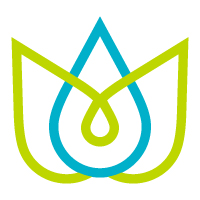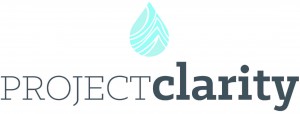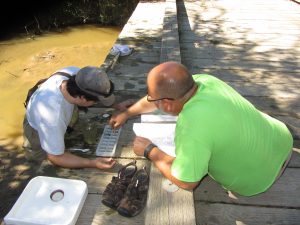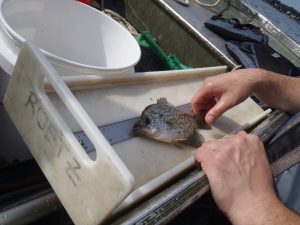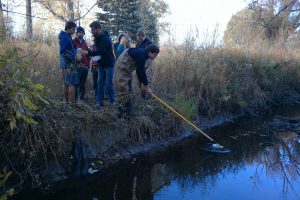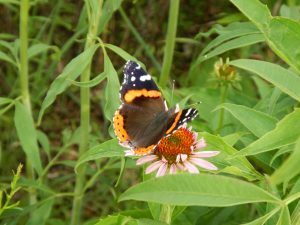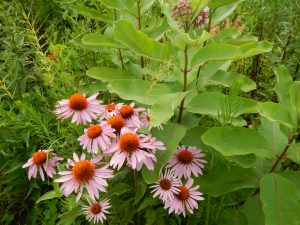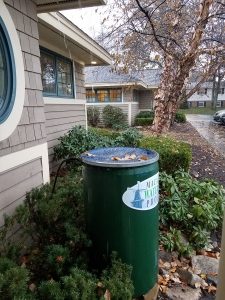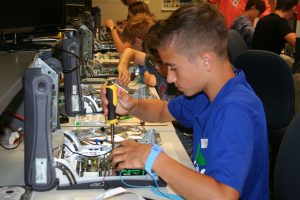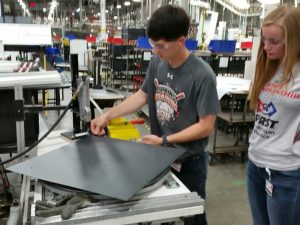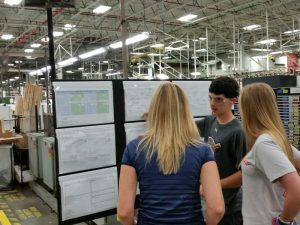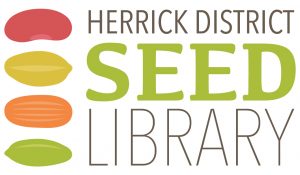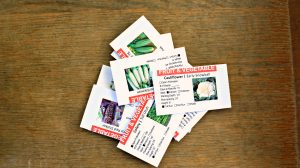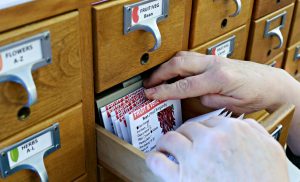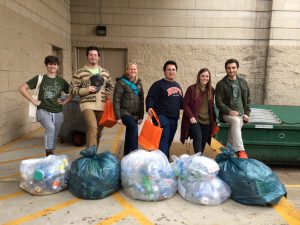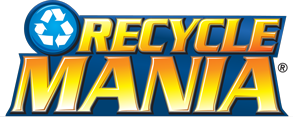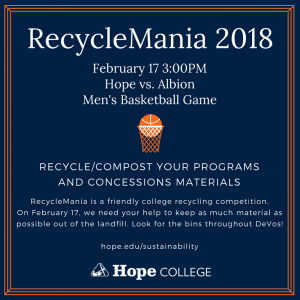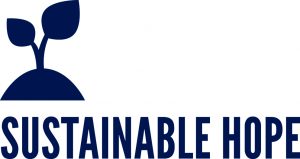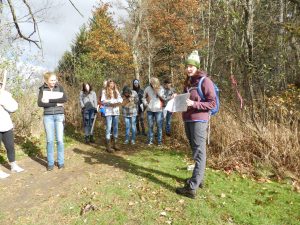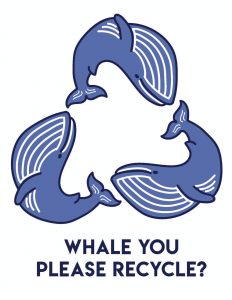March 2018 Sustainability News
March 31, 2018 – DOWNLOAD YOUR DIGITAL GUIDE TO WILDFLOWERS IN WEST MICHIGAN!
March 31, 2018 – Resource from the MSU Extension. How to plan your garden tip sheet.
March 30, 2018 – Big in Sweden: Picking up trash + jogging = ‘plogging’
March 30, 2018 – A break for spring: Week is full of activities for students
March 30, 2018 – Holland schools recognized for positive behavior
March 30, 2018 – Wind energy plays leading role in Michigan utility’s renewable plans
March 30, 2018 – Multiple environmental groups oppose Saugatuck Dunes development
March 29, 2018 – Local women fill business leadership roles
March 28, 2018 – Fossil Fuels Squeezed by Plunge in Cost of Renewables, BNEF Says
March 27, 2018 – Upton talks school safety, Great Lakes protection at Holland event
March 27, 2018 – MAX interim directors chosen during embezzlement investigation
March 26, 2018 – Living Sustainably: Watershed monitoring is community effort
March 26, 2018 – Work release program places inmates at Kent County recycling center
March 26, 2018 – US stocks rally; Dow surges 669, clawing back lost ground
March 24, 2018 – Michigan retailers experience slow start to 2018
March 23, 2018 – Couple offers recycling solution: RecycleBoxBin provides unobtrusive bins, hopes to educate community on good recycling habits.
March 23, 2018 – Great Lakes Invasive Carp Challenge finalists to compete Tuesday in livestream event (recording is available)
March 23, 2018 – China imposes retaliatory tariffs on 128 American products, roiling US markets
March 23, 2018 – Volunteers search for affordable housing units in Ottawa County
March 22, 2018 – How to Shop for Used Clothes ” and Why You Should
March 21, 2018 – Holland Energy Park helps reduce city’s carbon footprint
March 21, 2018 – Neighborhood petition impacts process of Hope Ave. reconstruction
March 21, 2018 – Letter: Hope Ave. project needed better handling
March 21, 2018 – Mushrooms: Gentle on the Planet, Healthy on the Plate
March 20, 2018 – 7 plant-based tips for a healthy weight
March 20, 2018 – Earth Day 101: 6 impactful ways to teach your kids about food waste
March 19, 2018 – Living Sustainably: How to ‘green’ your yard’s warm weather routine
March 19, 2018 – 6 skills of happiness help teens live a more positive life
March 19, 2018 – 10 reasons to plant a tree this spring
March 18, 2018 – Ottawa County: healthiest county in Michigan
March 16, 2018 – Holland police investigating embezzlement at MAX Transit
March 16, 2018 – Plastic Packaging Hospital Waste Recycling Initiative Kicks Off in the US
March 16, 2018 – Developer Hits Milestone for Large 100% Geothermal Community in Kentucky
March 15, 2018 – Big Efforts at Fort Hood Pay Off: Recycling Program Leads to Revenue
March 15, 2018 – Don’t Forget About Flint, Michigan
March 15, 2018 – Lighting Technology Can Reap Energy Savings of Up To 70%
March 15, 2018 – Bioplastics Can Pose Hidden Risks for Corporations
March 15, 2018 – Mindful eating: 5 ways millennials are driving healthier diets
March 15, 2018 – Dust storms + snowpack raise late-summer water concerns
March 14, 2018 – GREEN HOPE TAPS MAPLE SYRUP IN PINE GROVE
March 14, 2018 – Restaurant Industry Faces Challenges with Plant-Based Packaging Shift
March 13, 2018 – Coastal states opposing offshore drilling plan
March 13, 2018 – These March Madness mascots are in danger from climate change
March 13, 2018 – Holland BPW proposes lower costs for electric utility
March 13, 2018 – The year-long Dance Marathon fundraiser culminated with a 24-hour dance-a-thon, raising $311,442.19 for the Helen DeVos Children’s Hospital
March 12, 2018 – Living Sustainably: Skilled workers needed to sustain local manufacturing
March 12, 2018 – Hope College has again been selected in 2018 as one of “West Michigan’s 101 Best & Brightest Companies to Work For”! This will be the 13th year that Hope College has been honored with this award.
March 12, 2018 – This technique could restore a big chunk of Amazon rainforest
March 12, 2018 – 50 gallons of sewer discharged at Grove Lift Station
March 11, 2018 – Owens, Wilderer named among ‘Most Influential’ women
March 9, 2018 – Too Much Technology: Children Growing up With Weak Hands, Fingers
March 9, 2018 – Community-Scale Solar to Account for 10% of US Power? Could Be…
March 8, 2018 – Hope College in top 25 colleges in Peace Corps volunteers
March 7, 2018 – Kohler Signs 100-MW Wind Power PPA with Enel Green Power North America
March 7, 2018 – MICHIGAN SPACE GRANT CONSORTIUM SUPPORTS SEVERAL HOPE COLLEGE PROJECTS
March 6, 2018 – Saving South Africa: The Real Issues Businesses Face When it Comes to Water Shortages
March 6, 2018 – GE Develops ‘World’s Largest Offshore Wind Turbine’
March 5, 2018 – Living Sustainably: Herrick’s collection ‘grows’ with new seed library
March 5, 2018 – Climate Action Makes Business Sense – See These Recent Commitments
March 5, 2018 – Grand Rapids parent fighting lead poisoning wins environmental award
March 5, 2018 – Holland Christian adding nature-based kindergarten
March 5, 2018 – Ways to conserve water
March 4, 2018 – Construction could start on Grand River restoration next year
March 4, 2018 – Women change agents panel to be held at Herrick District Library
March 4, 2018 – West Michigan’s Blue Economy: A Special Report from MiBiz
March 4, 2018 – Amid transition to clean energy, utilities tackle water conservation
March 4, 2018 – How to keep your seafood wild
March 2, 2018 – Ottawa County to begin search for new assistant administrator
March 2, 2018 – County OKs $37,640 to improve historic barn at Eastmanville Farm
March 1, 2018 – Michigan Legislature OKs $175M infusion into roads, bridges
March 1, 2018 – They’re Here to Fix Climate Change! They’re College Republicans.
March 1, 2018 – The 50 Most Influential Women in West Michigan – 2018




